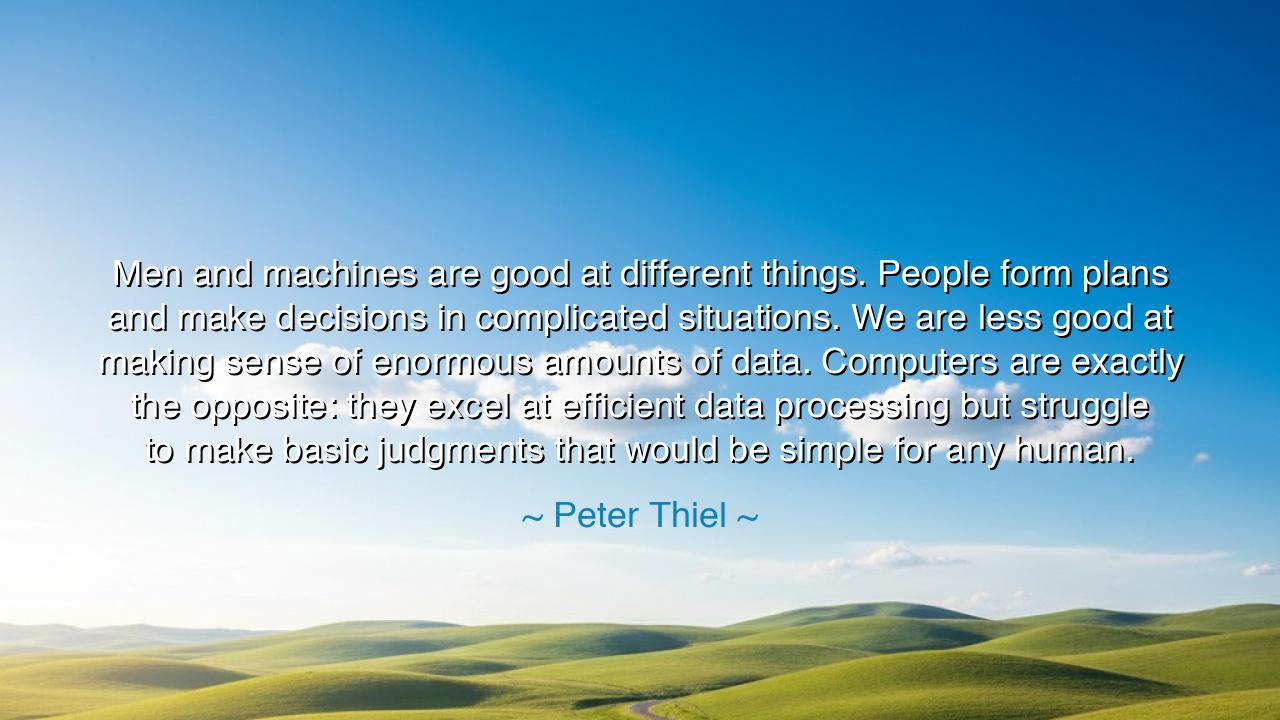
Men and machines are good at different things. People form plans
Men and machines are good at different things. People form plans and make decisions in complicated situations. We are less good at making sense of enormous amounts of data. Computers are exactly the opposite: they excel at efficient data processing but struggle to make basic judgments that would be simple for any human.






"Men and machines are good at different things. People form plans and make decisions in complicated situations. We are less good at making sense of enormous amounts of data. Computers are exactly the opposite: they excel at efficient data processing but struggle to make basic judgments that would be simple for any human." – Peter Thiel
In the vast expanse of human history, mankind has always sought to understand and shape the world around them. From the first sparks of creation, humans have engaged in a delicate dance between reason and intuition, ever searching for ways to make sense of the complexities of life. The words of Peter Thiel echo a timeless truth: the human mind and the machine are complementary forces, each excelling in areas where the other falters. Humans are, by nature, visionaries—capable of forming plans, navigating complicated situations, and making judgments that transcend the raw data before us. Machines, on the other hand, are the great processors, capable of handling vast quantities of information, but they lack the capacity for the intuitive decisions that human experience affords.
The ancient Greeks understood well the differences between logic and intuition. The philosopher Aristotle laid the foundation for logical reasoning, emphasizing that humans could move beyond instinct to deliberate over choices. Yet, he also acknowledged that wisdom required more than just the exercise of the mind—it required experience and judgment, faculties that machines could not possess. In much the same way, Thiel’s insight about machines processing data yet struggling with judgment speaks to a profound truth: humanity’s strength lies not only in the mind, but in the soul’s ability to assess situations with compassion, foresight, and understanding.
Consider the ancient myth of Prometheus, who stole fire from the gods to give to humans, bringing the light of knowledge and progress into the world. Prometheus was not only a symbol of human ingenuity but also of the sacrifices that must be made to harness the power of knowledge. Fire, like data, can be a tool for great advancement, but without the wisdom to wield it, it can also lead to destruction. In this story, humans are the ones who, by using their judgment, can shape the tools around them to serve a greater purpose. Similarly, Thiel’s quote reminds us that while machines may excel in processing information, it is humans who must guide those machines, making sense of the data they produce and using it to forge a meaningful path.
Think of the development of the printing press, which transformed society by making knowledge more accessible and widespread. Gutenberg’s press allowed the rapid dissemination of ideas, yet it was the human mind that interpreted, debated, and used that knowledge to shape the world. The printing press, like the computers of today, was a powerful tool for processing information. However, it was the critical thinking of individuals, like Martin Luther with his 95 Theses, that turned the availability of knowledge into a revolution. Machines—whether in the form of the press or the computer—serve as tools, but humans must be the ones to use them wisely, making decisions and judgments that determine their impact on the world.
In modern society, we see the same dichotomy between the strengths of humans and machines. Consider the field of medicine, where computers process vast amounts of patient data, diagnosing diseases more accurately than any human could alone. Yet, it is the doctor, with years of experience, who must weigh the nuances of each patient’s emotional state, environment, and personal history—factors that cannot be captured in raw numbers. The machine can give a diagnosis, but only the doctor’s judgment can lead to the personalized care that takes the whole person into account. This partnership between human intuition and machine processing is the ideal: where reason and compassion guide the mechanical power of computers toward greater good.
The lesson here is clear: while we are living in an age where technology is advancing rapidly, humanity must not lose sight of what makes us uniquely capable of great progress—our ability to think critically, to make decisions based not just on data, but on our experience, intuition, and moral compass. Thiel’s quote reminds us that technology, while powerful, should not overshadow the fundamental qualities of the human spirit. We must embrace the partnership between humans and machines, where each complements the other, allowing us to achieve progress without sacrificing the very essence of what makes us human.
As we move forward in a world increasingly shaped by artificial intelligence and data processing, let us remember that the future is not just about how much data we can process or how many machines we can build. The future is about how we use those tools to enhance our judgments, to create a world where wisdom and compassion guide our progress. In this age of information, let us hold onto the wisdom of the ancients, who knew that the greatest advancement came not from raw data, but from the ability to apply that data with understanding, purpose, and humanity.






AAdministratorAdministrator
Welcome, honored guests. Please leave a comment, we will respond soon